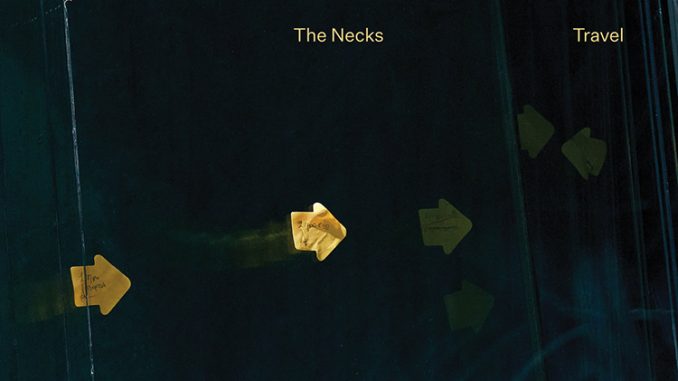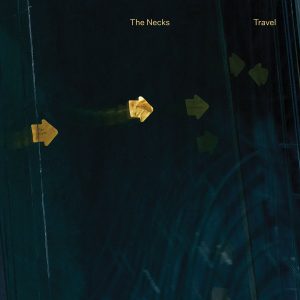
Review by Des Cowley.
The Necks – Travel (Northern Spy, NS158, Vinyl, CD & digital release)
Simply put, Sydney trio The Necks defy category. I caught them on their recent 2023 tour, and was astonished – yet again – by their capacity to uncoil, from scratch, extended improvisations, working without a net. What’s mind-boggling is that they’ve been doing this for thirty-five years, without ever really dropping the ball. Mid-stream through their second set at Brunswick Ballroom a few weeks back, it felt like my mind was melting, an hour went by in a second, like a strange dream.
Anyone who has seen the band play live knows the drill: two improvised sets, sixty-minutes apiece, never to be repeated. But when The Necks enter the studio, it’s a whole other matter. There, they regularly experiment with variant sounds, durations, electronics, organ, ambient set-ups. It’s as if, via the use of overdubs and post-production effects, they treat the studio as a fourth instrument. And while the end result is recognisably The Necks, they clearly perceive the studio as offering up a new dimension, a differing canvas. Across the space of nineteen studio albums, to date, they have literally torn up the rule-book for piano trios. Not for nothing are they recognised worldwide as one of the leading purveyors of experimental music in all its guises: minimalism, ambient, drone, post-rock. Should we add jazz?
 Bassist Lloyd Swanton has spoken of the trio’s regular habit of beginning each day in the studio with a twenty-minute improvisation. Travel is made up of four such ‘warm-up’ pieces, one per side on the vinyl edition: ‘Signal’, ‘Forming’, ‘Imprinting’, ‘Bloodstream’.
Bassist Lloyd Swanton has spoken of the trio’s regular habit of beginning each day in the studio with a twenty-minute improvisation. Travel is made up of four such ‘warm-up’ pieces, one per side on the vinyl edition: ‘Signal’, ‘Forming’, ‘Imprinting’, ‘Bloodstream’.
Take ‘Bloodstream’, by way of example. While retaining the aural feel of a Necks’ performance, the trio’s sound palette, at micro-particle level, undergoes a subtle shift. It’s possible to discern a granular focus on detail: textural strands, colours, ambient subliminal noises, the overall effect being one of mind-altering weirdness. Abrahams’ piano is muted, pitched off-key; Buck indulges in low-key rhythmic patter; while Swanton chews at the edges, noodling his way through the mix. It’s spacy, minimal, fed by pocket-sized bursts of organ, building organically, inward-facing, without undue drama or fanfare. The piece burns with a subdued intensity, unfolding like a journey, carried along by an inexorable forward momentum, while – and this is where the sleight of hand comes in – simultaneously appearing to hover in perfect stasis.
The album’s opener, ‘Signal’, alternatively, comes across as one deep continuous groove. Ushered in by a gorgeous bass riff, unflaggingly maintained throughout, it seems to galvanize Chris Abrahams, whose piano emanates a middle-eastern glow, dispensing chromatic and multi-hued tones that shimmer, glisten. Gradually, the drone of a whirling organ, in-out, enters the fray, adding a spectral element, before Abraham’s piano re-materialises, trickling a series of sublime notes, sparsely designed, propped by Swanton’s incessant bass, and Buck’s exacting percussion. It’s mesmerising, hypnotic, a ghostly dreamscape. And it goes on like that for twenty-minutes, never flagging, never running out of ideas or steam.
Should we consider these pieces as drafts or sketches? Yes and no. As with all The Necks’ work, the four pieces on Travel are rendered as complete. They are one-off compositions, forged in real time, meshing spontaneity with rigidity, flow with repetition. Rather than sketches, perhaps we can think of them as maps, begging the obvious question: maps to where? There’s no easy answer to that. Best to listen closely, and see where you end up.

